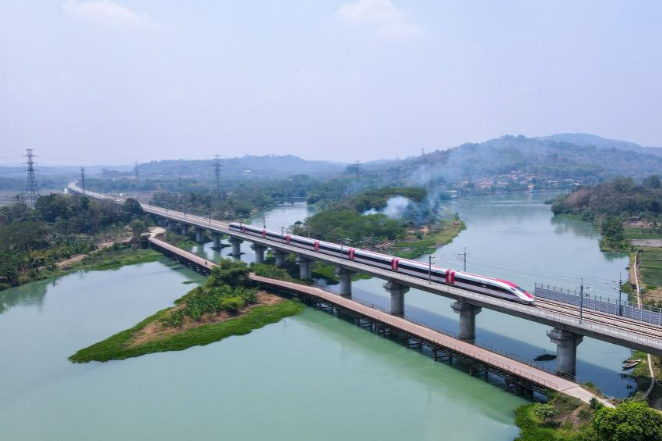Beijing, Jakarta Expand Partnerships

Chinese Ambassador to Indonesia Wang Lutong has highlighted the deepening collaboration between China and Indonesia, particularly in the realms of digital economy and green development, building upon the success of the Jakarta-Bandung High-Speed Railway. This year marks the 75th anniversary of diplomatic relations between the two nations, characterized by strong momentum and mutually beneficial cooperation that serves as a model for Global South countries.
Ambassador Wang noted that bilateral trade has consistently exceeded $100 billion annually, reaching $147.8 billion last year, which is more than triple the volume from a decade prior. He cited the Jakarta-Bandung High-Speed Railway, the first of its kind in Southeast Asia, as a prime example of high-quality Belt and Road cooperation. The railway has significantly reduced travel time between Jakarta and Bandung, from over three hours to just 40 minutes, and has already transported more than 8 million passengers.
"The success of the railway demonstrates the strengths of high-quality infrastructure cooperation between China and Indonesia and has boosted confidence among other members of the Association of Southeast Asian Nations in partnering with China on similar projects," Wang stated.
As China deepens its reforms and expands high-level opening-up, Chinese modernization is expected to offer greater prospects for cooperation and shared growth dividends to Indonesia and the broader region. Wang emphasized that Chinese modernization, driven by innovation, positions China as a leader in the digital economy, artificial intelligence, and green, low-carbon development, which will inject new dynamic into the bilateral partnership.
Recent advancements in nickel smelting, power batteries, and green energy have established Indonesia as a key global hub for stainless steel and new energy battery materials. These advancements have accelerated industrial upgrading, fostered sustainable economic growth, and provided a development model for other ASEAN countries. China aims to further unleash its vast market potential and increase market access for high-quality Indonesian products, such as palm oil, to support Indonesia's economic growth.
Beyond infrastructure and trade, China is committed to aligning its efforts with Indonesia's development strategies to promote more high-quality, sustainable, and people-centered projects. Wang noted the positive perception of China as a trustworthy partner across Indonesian society, based on his interactions with government officials, business leaders, academics, and ordinary citizens.
"Many Indonesian friends have expressed admiration for China's achievements in technological innovation, infrastructure, and green development. They hope to learn from China's experience, deepen cooperation, and seize shared development opportunities," Wang said. He also highlighted the deep cultural affinity Indonesians have toward China, with widespread interest in Chinese language, cuisine, and martial arts, as well as significant interest from Indonesian academia and think tanks in China's development philosophies and global initiatives.
Rooted in a strong foundation of friendship, China-Indonesia relations have vast potential for future cooperation. As major developing countries and representatives of the Global South, their relations transcend bilateral ties, especially in the current complex geopolitical landscape and amid rising protectionism. Both nations uphold the principles of the United Nations Charter, safeguard free trade and the multilateral system, and jointly support China's Global Development Initiative, Global Security Initiative, and Global Civilization Initiative.
Ambassador Wang emphasized that China and Indonesia share the responsibility of uniting Global South nations, upholding justice, and advancing a more equitable global governance system. He also pointed out the benefits of tariff reductions under the Regional Comprehensive Economic Partnership, which have strengthened regional industrial and supply chains and boosted the competitiveness of Indonesian exports. Indonesia's recent decision to join the New Development Bank, following its full membership in BRICS in January, further positions China and Indonesia to deepen all-round, multilevel cooperation within BRICS, injecting greater momentum into regional peace and prosperity.











